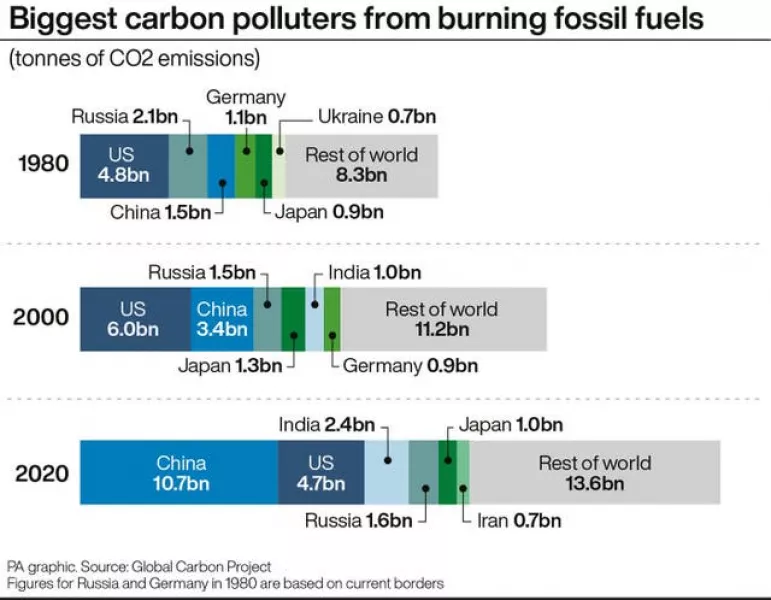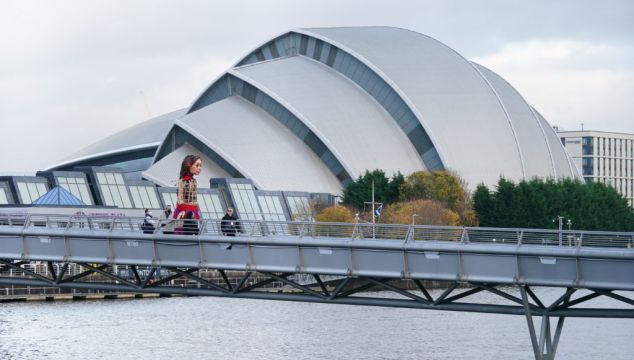A first draft of a pact that could be agreed at Cop26 urges countries to strengthen their emissions-cutting plans for the 2020s in the next year.
A draft “cover decision” published on Wednesday morning also urges them to set out long-term strategies by the end of next year to reach net-zero emissions by around mid-century, to curb warming to 1.5 degrees.
The document, which was published by the UK Cop26 presidency around six hours later than expected, will have to be negotiated and agreed by countries attending the talks.
It says meeting the goal to limit global warming to 1.5 degrees – which countries pledged to try to pursue under the Paris climate accord – needs meaningful and effective action in “this critical decade”.

Scientists have warned that keeping temperature rises to 1.5 degrees, beyond which the worst impacts of climate change will be felt, requires global emissions to be cut by 45 per cent by 2030 and to zero overall by mid-century – but country plans for this decade leave the world well off track for the goal.
The document calls for countries to accelerate the phasing-out of coal and subsidies for fossil fuels, and for developed countries to at least double their collective provision of climate finance to help developing countries adapt to climate change, as part of scaling money for poorer nations to tackle the crisis.
Delegations are expected to be in contact with their leaders and capitals to discuss what their position on it will be – particularly in those countries whose leaders did not attend the world leaders’ summit, such as China and Russia.
British prime minister Boris Johnson has urged countries to “pull out all the stops” to agree climate action ahead of returning to the Glasgow summit as it enters its final days.
Negotiators are also trying to hammer out agreement on technical parts of the global climate treaty, the Paris Agreement, including common timeframes for national commitments on emissions reductions and agreed ways for countries to report on their progress, to help turn pledges into action.
There are also negotiations on providing finance for developing countries to cope with climate change and address the issue of loss and damage to people, livelihoods, land and infrastructure caused by global warming in poorer nations.
#COP26: The new draft final decision text published today is not a plan to solve the climate crisis, it’s an agreement that we’ll all cross our fingers and hope for the best. It’s a polite request that countries maybe, possibly, do more next year. That’s not good enough.
(1/2)Advertisement— Jennifer Morgan (@climatemorgan) November 10, 2021
Campaigners were quick to criticise the draft deal as not strong enough.
Greenpeace International executive director Jennifer Morgan said the draft deal was “not a plan to solve the climate crisis”.
“It’s a polite request that countries maybe, possibly, do more next year,” she said.
It comes as analysis shows the world is on track for 2.4 degrees of warming based on current pledges of action up to 2030.
Ms Morgan said: “The job of this conference was always to get that number down to 1.5 degrees, but with this text world leaders are punting it to next year.
“If this is the best they can come up with then it’s no wonder kids today are furious at them,” she said, adding it needed to be much stronger on finance and adaptation for developing countries.
Mr Johnson said: “Negotiating teams are doing the hard yards in these final days of Cop26 to turn promises into action on climate change.
“There’s still much to do. Today I’ll be meeting with ministers and negotiators to hear about where progress has been made and where the gaps must be bridged.
“This is bigger than any one country and it is time for nations to put aside differences and come together for our planet and our people.
“We need to pull out all the stops if we’re going to keep 1.5 degrees within our grasp.”
Alongside the negotiations, the Cop26 conference is marking “transport day”, with a number of aims drawn up. Thirty countries have agreed to work together to make zero emissions vehicles the new normal, and plans for “green shipping corridors” will be unveiled – facilitating a shift to zero emissions vessels.
Also, 14 states, collectively making up for more than 40 per cent of global aviation emissions, have put their names to a commitment to a new decarbonisation target.







